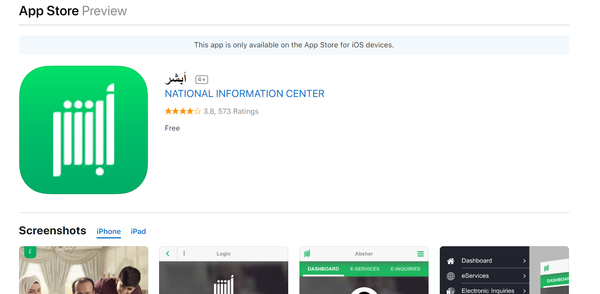The app, called Absher, was developed by the Saudi Arabia National Information Center, which, according to its website, aims to achieve "security and stability Kingdom-wide, provide tranquility and safety for the citizens and and fight against all means of crime to ensure the safety of Saudi society and its development." The National Information Center is a "project" under the Saudi Arabian Ministry of Interior, the website adds.
According to the description of the app in the Apple Store, with Absher, "you can safely browse your profile or your family members, or [laborers] working for you, and perform a wide range of eServices online."
The app allows men to specify when and where women under their guardianship or others identified as "dependents" are permitted to travel, sending an automatic text when those individuals attempt to use their passport at border crossings or airport check-ins.
According to Human Rights Watch, Saudi Arabia has an abusive labor system that traps migrants into illegal employment and does not allow them to switch jobs without employer approval. Under the country's "kafala," or sponsorship, program, migrant workers residency permits are tied to "sponsoring" employers.
Employers will often abuse their positions by confiscating laborers' passports, withholding their wages or forcing them to work under abusive conditions. In a 2008 report by Human Rights Watch, multiple abuses against around 1.5 million migrant domestic workers (primarily from Indonesia, Sri Lanka and the Philippines) in Saudi Arabia were documented, including non-payment of salaries, forced confinement, food deprivation, excessive workload and severe psychological, physical and sexual abuse.
When Cook was asked about Absher in an interview with NPR Monday, he said, "I haven't heard about it. But obviously we'll take a look at it."
Despite Saudi Arabia's recent liberalization efforts, such as allowing women to drive as of June 24, 2018, the country still has multiple controversial laws in place. Under Saudi Arabia's male guardianship system, a woman must have a male guardian — either a father, brother, husband or son — to make decisions on her behalf. In addition, there is no penal code in the country that specifically criminalizes rape. There are also no laws outlawing marital or statutory rape.
Human rights activists have expressed concern over the app's ability to control women's movements in a country where their rights are already highly restricted.
"It's really designed with the men in mind," Rothna Begum, a senior researcher on women's rights at Human Rights Watch, told NPR. "Of course, it's incredibly demeaning, insulting and humiliating for the women and downright abusive in many cases, because you're allowing men absolute control over women's movements."
On Monday, Sen. Ron Wyden (D-OR) sent a letter to Google and Apple, requesting they remove the app — which allows users to list "dependents" by name and passport number, restricting their ability to travel — from their platforms.
— Ron Wyden (@RonWyden) February 11, 2019
"Saudi men can also reportedly use Absher to receive real-time text message alerts every time these women enter or leave the country or to prevent these women from leaving the country," he wrote in his letter.
"It is hardly news that the Saudi monarchy seeks to restrict and repress Saudi women, but American companies should not enable or facilitate the Saudi government's patriarchy," he added.
"To that end, I ask that you take immediate action to prevent your technical infrastructure, including your app stores, from being used by the Saudi government to enable the abhorrent surveillance and control of women," he continued.




